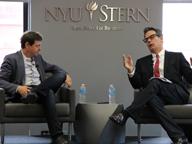Research Center Events
—
Derivatives 2013:The State of the Art
—

In honor of the 40th anniversary of the celebrated paper, "Theory of Rational Option Pricing," Myron Scholes, Robert Merton and Steve Ross will join some of the most active and influential researchers in the field today to discuss how derivatives theory and practice have developed since 1973 and where they are headed.
Research Center Events
—

In honor of the 40th anniversary of the celebrated paper, "Theory of Rational Option Pricing," Myron Scholes, Robert Merton and Steve Ross will join some of the most active and influential researchers in the field today to discuss how derivatives theory and practice have developed since 1973 and where they are headed.



















